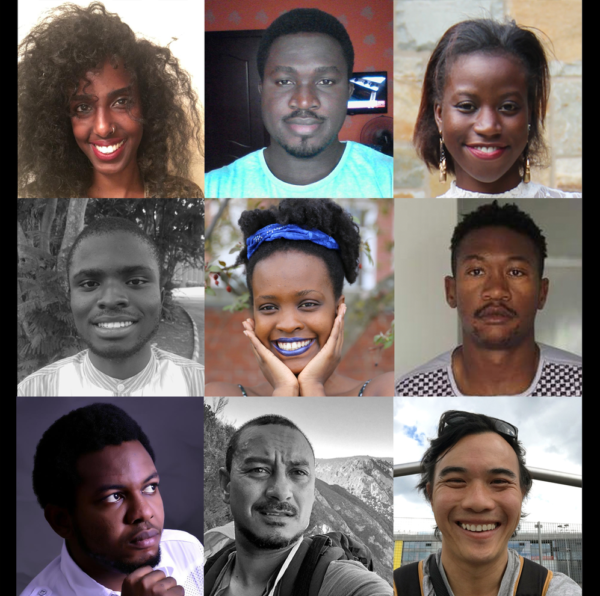
Short Story Day Africa has announced the shortlist for its $800 2017/18 Prize. The Prize’s theme, announced in 2017, is ID—meaning both “identity” and the psychoanalytic concept of the Id—and required “innovative short fiction that explores identity, especially (but not limited to) the themes of gender identity and sexuality.” This year, the shortlist comprises nine works rather than the usual six.
Here is part of the announcement:
We were impressed as never before by the multiple ways in which writers from all over the continent responded, the depth, variety and innovation of their interpretations. From Benin to Ethiopia, from Morocco to South Africa, the stories on the long list reveal uncomfortable and fascinating truths about who we are.
Once editing was completed, the twenty-one stories were sent to the judges. The decision to edit the stories and to engage with the authors before judging has proven to be invaluable in enabling young writers and raw talent to compete on an equal footing with their more established and experienced peers. The final stories and indeed the shortlisted stories are more evenly balanced between those already making their mark in terms of publication and awards, and extremely talented writers who are new to the adventure of publishing or only just venturing into the terrain of short fiction.
This year, for the first time, we opted for a broad spread of volunteer judges, ably assisted by The Johannesburg Review of Books, rendering the evaluation process flatter, more consultative and democratic. The combination of the new scoring system and the extremely high standard of the stories meant that for the first time, we’ve produced a short list of nine stories, instead of the usual six.
Here are the shortlisted works:
- “The Piano Player,” by Agazit Abate (Ethiopia)
- “Ibinabo,” by Michael Agugom (Nigeria)
- “The Geography of Sunflowers,” by Michelle Angwenyi (Kenya)
- “Limbo,” by Innocent Chizaram Ilo (Nigeria)
- “Sew My Mouth,” by Cherrie Kandie (Kenya)
- “South of Samora,” by Farai Mudzingwa (Zimbabwe)
- “All Our Lives,” by Tochukwu Emmanuel Okafor (Nigeria)
- “The House on the Corner,” by Lester Walbrugh (South Africa)
- “God Skin,” by Michael Yee (South Africa)
Some of the stories explore identity through queer sexuality, which SSDA welcomes as “an extremely important and necessary creative intervention, given the grim march of homophobia, including in legislative forms, across the African continent.” In “Ibinabo,” Michael Agugom “charts the challenges of negotiating biracial and sexually complex identities in a small and watchful Nigerian island community.” In “Sew My Mouth,” Cherrie Kandie “provides a powerful and painful account of the silencing (literally) of lesbian love in urban Nairobi.” In “The House on the Corner,” Lester Walbrugh “provides a moving interpretation of the perhaps ubiquitous ‘gay life in Cape Town’ narrative. In “Limbo,” Innocent Chizaram Ilo “provides a delightfully unusual and fantastical account of heartbreak as experienced by a lesbian scarecrow.” Michelle Angwenyi’s lyrical and hallucinatory “The Geography of Sunflowers” presents heteronormative love and loss as experiences that both heighten and blur identity.
Some of the stories explore identity through friendships and family bonds. In “South of Samora,” Farai Mudzingwa’s “delicate and moving” story, “a young man whose social standing is dependent on where he lives, forms a friendship with an ailing child that forces him to define himself.” Tochukwu Emmanuel Okafor’s “All Our Lives” is “a wry, clear-eyed, humorous and characteristically compassionate account of the identity (multiple identities, in fact) of a much-maligned community – young and disaffected men who drift into Nigerian cities in pursuit of a ‘better life.'” Agazit Abate’s “The Piano Player” is “a brilliant inversion of the ‘African abroad’ narrative as it presents snapshots of life in Addis Ababa through the eyes and ears of a pianist in a luxury hotel bar.” And Michael Yee’s “God Skin” “weaves together alienation, forbidden love and intimate violence against a subtle backdrop of the scars of Liberia’s civil war.”
The winner and two runners-up will be announced on 21 June 2018, the shortest day of the year in the southern hemisphere. The longlisted stories will appear in ID: New Short Fiction From Africa, edited by Nebila Abdulmelik, Otieno Owino and Helen Moffett, an anthology to be published by New Internationalist.
Congratulations to the nine finalists.









COMMENTS -
Reader Interactions